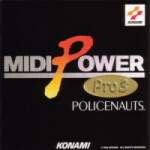Policenauts / MIDI Power Pro 3
 |
Album Title: MIDI Power Pro 3: Policenauts |
| Record Label: King Records |
|
| Catalog No.: KICA-7729 |
|
| Release Date: November 21, 1996 |
|
| Purchase: Buy Used Copy |
Overview
During the 1990s, Konami released six MIDI Power Pro albums dedicated to their most popular franchises. In each case, a team of talented arrangers — led by USP’s Eisaku Nambu — offered diverse and elaborate takes on numerous favourites. But as the name suggests, rather than incorporate live instruments, they relied principally on upper-end MIDI technology to realise their arrangements (often including floppy discs featuring the MIDI files as bonuses). While largely a detriment, it didn’t stop the majority of the albums still proving very enjoyable. MIDI Power Pro 3 -Policenauts- is no exception.
Body
The most spectacular additions to the album are certainly the cinematic pieces “Old L.A. 2040” and “Policenauts End Title”. The opener inspires a connection with the protagonist with its tender synth soundscapes, before using ever-shifting jazz stylings and bold solos to explore the vibrant, romantic, and sometimes murky world he will investigate with jazz stylings and bold solos. The closer is more dramatic, shifting from its soothing pop-flavoured first half into a clamorous orchestral march. Bonded together by their incorporation of the main theme, both tracks capture the essence of the Policenauts experience, while taking listeners on quite a journey during their extended playtimes. In contrast to other most additions to the album, however, these tracks are essentially resynthings of the originals rather than fully-fledged originals. The upgrade will be too modest to appeal to those that already own the Policenauts soundtrack, though these tracks are still spectacular bookends for the album.
As with the main soundtrack, MIDI Power Pro 3 -Policenauts- is often most enjoyable at its most cheesy. Just as with the original, “No, No, No!” instantly endears with its catchy disco-influenced melody and lulling rhythms. Eisaku Nambu takes few liberties with the main melody, though the more defined lead and richer mix ensures a more engaging experience. But once it explodes into a succession of over-the-top, 80s-inspired solos — with electric guitar, keyboard, bass, and finally saxophone all taking their turn — the arrangement easily stands up in its own right. It’s a pity that live instruments weren’t used here, as they could have turned the track from great to spectacular. Nevertheless, the quality of the samples and mixing still exceeds the original by quite a way and are at least listenable by today’s standards. It’s clear Nambu spent a lot of time polishing this one.
Continuing the light-hearted vibe, it’s also impressive how Goro Takahashi transforms “Girl” — a pleasant but inconsequential addition to the soundtrack — into a major stand-alone highlight. The jazz fusion stylings just ooze a feel good vibe here — not too light, not too sleazy either. A perfect piece for a police headquarters, the bold and brassy “BCP H.Q.” will keep listeners entertained through its playtime. The main melody is instantly whistleable, while the solos always enhance rather than labour the flow. “Lavender” is also a likeable addition, blending the ‘feel good’ vibe of the rest of the album with some more tender, sensitive moments. However, this particular track actually sounds somewhat inferior to its amazing rendition featured in the soundtrack release — neither as lavishly styled nor beautifully recorded. Everything else just about holds up.
Though the album is primarily light-hearted, there are some well-placed tracks that add drama and depth to the experience. “Embarrassment ~ Murder ~ Shoot For Angels” and “Icy Offence and Defence” throw listeners into action with heavy, jagged avant-garde orchestration. Whereas the former brings tension to the start of the album, the latter provides a decisive push to the finish. Though blatantly synthesized, the MIDI samples here ensure these tracks are considerably more effective than their originals. Pieces such as the melancholic “L’amour Impossible” and romantic “Past Year at Sunset Beach” sound even more sentimental than ever. While those that enjoyed the game will find these nostalgic, others may find them unbearably saccharine. Regardless, they’re still placed in a thoughtful way on the album and help to round off the story.
Summary
MIDI Power Pro 3 -Policenauts- lacks the passionate performances and crystal clear recordings of the better-known arranged album Policenauts F/N. However, it makes up for it with diverse and polished arrangements of the excellent source material. They come together to offer quite a ride, while also capturing all the fun, drama, and cheese of the original game itself. There are times when the arrangements adhere too closely to the originals, though at least they stay faithful to the game story. Cautiously recommended for those looking to supplement their collection of Snatcher / Policenauts releases.
Do you agree with the review and score? Let us know in the comments below!
3.5
Posted on August 1, 2012 by Chris Greening. Last modified on January 19, 2016.














